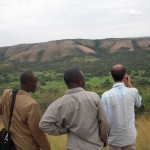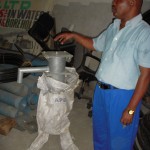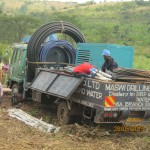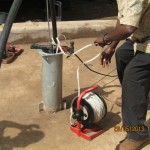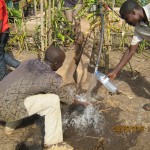Joel Gill writes about the implementation of a borehole in Kabalekela, a village in the north-west of Tanzania.
In 2009 and 2010 I visited the village of Kabalekela in the Kagera region of Tanzania to observe the situation there with regards to access to clean and safe water. In short, the village severely struggled to access any clean water. The nearest sources were several kilometres away, and there was no groundwater within digging distance. It was highly likely that a deep borehole would be necessary to provide this community with the safe water they desperately needed. Boreholes, however are expensive options, especially in such a rural location that is hard to access by road.
The Tumaini Fund, a charity operating in the region, persisted in working with the local community to help them get access to clean water. They managed to secure the necessary funds, and a couple of weeks ago a borehole was implemented in this village. A contractor was hired to conduct a geophysical survey, and drill to 80m. Commendably, the Tumani Fund have also worked hard to establish a Water User Group to manage and maintain the water source – which will supply over a thousand people.
The series of photos below give you a taste of the story from 2009-2013, including initial surveying, evaluation of drilling companies, construction and water quality testing. The borehole you see in the final photo will now have a pump attached, a fence built around it, and with sustainable operation and maintenance programmes in place, should last for many years – revolutionising the healthcare, education and income generation of the entire community.
- A preliminary survey of geology and hydrogeology in the village of Kabalekela in the summer of 2009. (Credit: Stephanie Powell, 2009)
- Evaluating potential drilling companies in Mwanza, a major city in the north of Tanzania. Ensuring a company is competent in geology, hydrogeology, engineering and drilling – and evaluating their reliability and reputation. (Credit: Joel Gill, 2010)
- Evaluating potential drilling companies in Mwanza, a major city in the north of Tanzania. Ensuring a company is competent in geology, hydrogeology, engineering and drilling – and evaluating their reliability and reputation. (Credit: Joel Gill, 2010)
- Equipment belonging to the construction company, implementing the borehole. Credit: The Tumaini Fund (2013)
- Use of a piezometer to monitor the level of the water table. Credit: The Tumaini Fund (2013)
- Collection of water to analyse for heavy metal contamination. Credit: The Tumaini Fund (2013)

